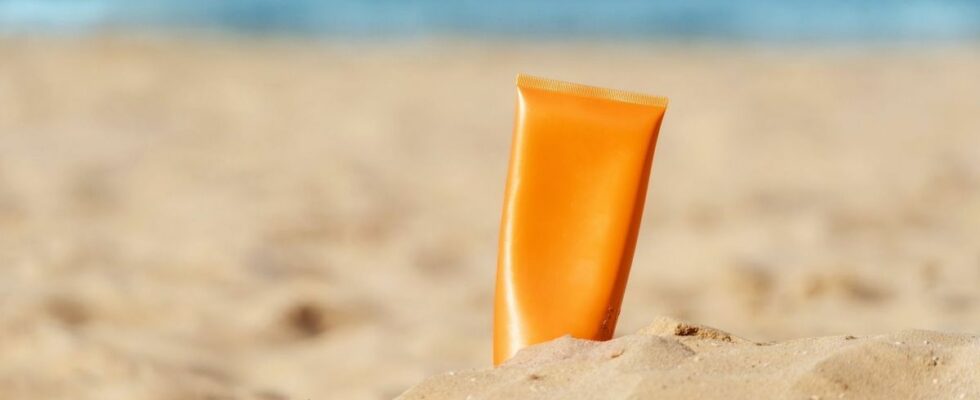Published on
Updated
Reading 4 min.
Essential for sunny days, sunscreen raises many questions among consumers. Which one to choose and why? Here is the answer to your questions!
As sunny days approach, it is essential to use sunscreen to protect your skin from sun damage. To choose it well, it is always better to know what it contains and for what reasons. Experts answer all your questions and help you better choose your sunscreen.
What does the term SPF 50 mean?
More and more people are wondering what the term SPF means, so what is it? The famous SPF (Sun Protection Factor) is an index of the level of protection of a sunscreen product against UVB. It therefore designates the ability of a sunscreen to delay the appearance of a sunburn. Each solar index then corresponds to a percentage of UVB blocked.
What is the difference with SPF 50 +?
A product with an SPF 50+ index means that the protection index is between 60 and 100. According to Fanny Teil, A-DERMA and DUCRAY medical manager, it is important to remember that “no sunscreen product protects 100% against UV rays. In reality, products with SPF 100 provide 99% protection.”. The mention the reference “full screen” is therefore incorrect and banned in France since 2006, in order not to mislead consumers.
For my skin, should I choose UVA or UVB protection?
Many people wonder what the difference is between UVA and UVB. A-DERMA and DUCRAY medical manager Fanny Teil explains that “UVB represents only 5% of UV rays that reach our skin. They mainly act on the superficial layers and appear from the first exposures”. It is also UV rays that cause tanning and the famous sunburns.
And UVA? They represent 95% of UV rays that reach the skin. Although they are completely painless, you should still be wary of them because “they penetrate much deeper” explains the expert. “The effects of these UV rays take hold over time and exposure and are the cause of sun allergies, skin aging and the development of wrinkles” she adds.
Thus, UVA and UVB contribute to the risk of skin cancer. It is therefore important to choose sun protection that protects against these two types of rays. A word of advice: when choosing your products, opt for those that have the UVA logo next to the SPF, as is the case with sunscreen products from Avène or Klorane.
What does a so-called “photostable” and “water-resistant” sunscreen mean?
Between sweating and swimming, in summer, the opportunities to be confronted with water are recurring, and can reduce the effectiveness of sun protection. Many sunscreens are therefore developed to be photostable and water resistant. But what does that actually mean?
According to medical manager Fanny Teil, “sun protection would be water resistant if the SPF value after two baths remains greater than or equal to 50% of the SPF displayed on the product. If it lasts more than four baths, we’re talking about very resistant sunscreen.”
Furthermore, a photostable sunscreen has a level of protection that does not degrade during exposure to the sun.
What is sunscreen with an organic filter?
The aim of organic filters is to penetrate the epidermis and absorb UV radiation. Currently, there are more than 30 on the market. Among them, we find the TRIASORB™ filter, created by Pierre Fabre laboratories. His particuliarity ? In addition to absorbing the sun’s rays, this filter reflects the harmful part, including UVB, UVA and blue light. The advantage? We obtain highly protective sun products!
And a mineral filter?
As A-DERMA and DUCRAY medical manager Fanny Teil explains, “mineral filters form a protective barrier and act like a mirror that reflects ultraviolet rays”. Currently, only two of them are authorized by European cosmetic regulations in the composition of sunscreen products. “These are zinc oxide and titanium dioxide” specifies the expert.
A word of advice: to benefit from 100% mineral protection, you can opt for Mineral Fluid SPF 50+ from the Avène brand.
A sunscreen good for the oceans and corals, is it possible?
Among the major new concerns of Internet users: the impact of solar products on marine environments. They therefore wonder what we mean by “sun protection good for oceans and corals”. This is a sunscreen product specially designed to have a minimal impact on the marine environment, while still protecting the skin against UV rays, of course!
How do they do ? They use few filters and no harmful chemical ingredients such as silicone, paraben or oxybenzone. This allows for better biodegradability of the product.
This is also the case for the following products:
- Intense Protect 50+, from Avène;
- POCKET SPF50+ invisible facial solar fluid, from A-DERMA;
- The sublime SPF 50 sun spray, from Klorane.
And what is the KPF?
KPF (for Keratin Protection Factor) concerns the protection of your hair! In fact, this is the protection index of the hair fiber, or in other words what will help protect the keratin of the hair. “It’s actually the only clue intended for hair”, adds Carole-Anne Bregeon – Development Manager René Furterer. Often it is a non-greasy, leave-in treatment, which protects from the sun and prevents dehydration of all hair types in summer.

